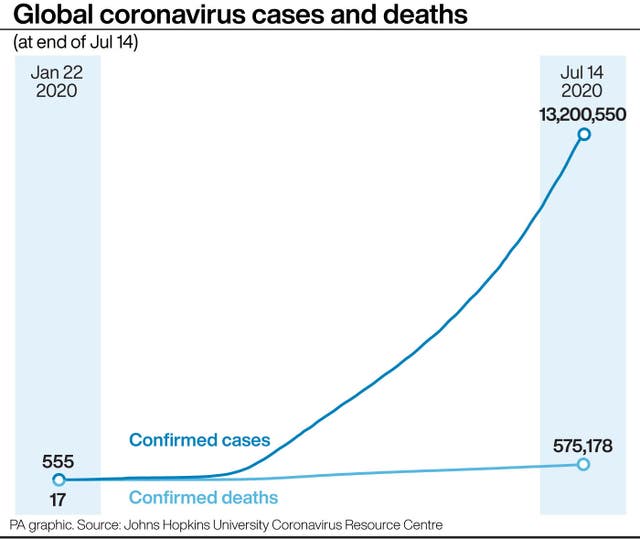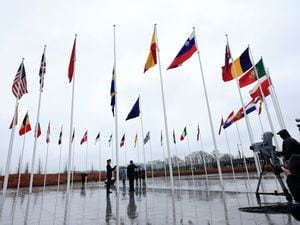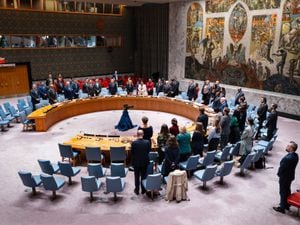Lifted lockdowns reimposed in bid to curb new outbreaks
More than 13.3 million people have been infected worldwide, and 578,000 have died.

Lifted lockdowns are being reimposed, shutting businesses and curbing people’s social lives again, as communities around the world try to stop a resurgence of coronavirus before it spins out of control.
Residents of Australia’s second-largest city were warned on Wednesday to comply with lockdown regulations or face tougher restrictions.
Melbourne’s five million people and part of the city’s semi-rural suburbs are a week into a new, six-week lockdown to contain a new outbreak there.

“The time for warnings, the time for cutting people slack is over,” Victoria state premier Daniel Andrews said.
“Where we are is in a very serious and deadly position.”
Victoria reported 238 new cases, which authorities say may indicate a stabilising trend under way in Melbourne’s outbreak.
Renewed restrictions took effect in Hong Kong on Wednesday, with public gatherings limited to four people, restaurants limited to takeaway after 6pm, and a one-week closure for gyms, karaoke bars, and selected other businesses.
Masks also are mandatory on public transport for the first time, with the non-compliant being fined.
Of the nearly two dozen possible Covid-19 vaccines in progress, candidates from the US, China and Britain are entering final testing stages.
The first one tested in the US revved up people’s immune systems just the way scientists had hoped, researchers reported Tuesday, as they are poised to begin key final testing.

In the US, places like Washington state are delaying timetables for reopening their economies. Governor Jay Inslee said counties will remain at their current stage of economic reopening at least until July 28.
Mr Inslee warned there was a “significant risk” that parts of the economy may have to be closed again if coronavirus activity continues to climb.
The United States is the worst-hit country, with 3.4 million cases, according to a Johns Hopkins University tally.
More than 13.3 million people have been infected worldwide, and 578,000 have died.
New Zealand has been a success story in the pandemic by pursuing the ambitious target of eradication of the virus.
Some in Australia are arguing more loudly that the Australian government should have also pursued eradication rather than suppression.
New Zealand has not recorded a locally spread case in 75 days, and all 27 of its active cases are people quarantined after foreign travel.

If it has a future community outbreak, a system of local or regional lockdowns would be used and a second national lockdown would be a last resort, Prime Minister Jacinda Ardern said.
“Our priority will be to control any cases with the least intrusive measures and over the smallest area we can,” Ms Ardern said.
“No-one wants to go backwards but the reality is our fight against the virus is not over and we must have a plan at the ready to protect our current position if it comes back.”
Some countries including South Korea have weathered the pandemic without severe economic lockdowns, although officials shut schools until May and temporarily closed leisure facilities in some major cities when infections rose.
Instead of stringent social restrictions, the country is attempting to contain its outbreak by mobilising technological tools to trace contacts and enforce quarantines.
Smartphone tracking apps monitor tens of thousands of individuals quarantined at home.

But health authorities in recent weeks have said they are finding it increasingly difficult to trace contacts and predict infection routes as people increasingly venture out in the public.
Business shutdowns were not enforced during Japan’s state of emergency that ended in late May, but many stores and restaurants closed on their own.
Recent spikes in Tokyo and other major cities have prompted local governments to take action.
About 100 infections on US military bases on the southern island of Okinawa prompted governor Denny Tamaki to demand the US military seal off the affected bases.
The US military said the affected bases have been placed under a lockdown. Defence minister Taro Kono said “a number of problems” have been found in the US military’s coronavirus handling.
In Tokyo, officials have largely identified night-time entertainment districts as hotbeds of the recent rises in Covid-19 cases and said shutdown requests were possible.
Israel moved last week to reimpose restrictions, closing events spaces, live show venues, bars and clubs. It has imposed lockdowns on areas with high infection rates, which in some cases sparked protests from residents.
Officials have warned that if case numbers do not come down in the coming days, Israel will have no choice but to lock the entire country down again, as it did in the spring.
“I don’t see what other tools we have aside from a lockdown,” Israeli health minister Yuli Edelstein told the Israeli news site Ynet. “Unless there is a miracle.”





